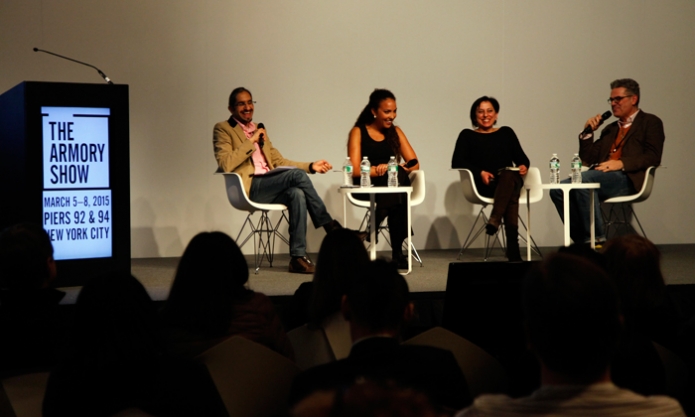
Sultan Sooud Al Qassemi moderating a panel on ‘MENAM IN A GLOBALIZED CULTURAL ECONOMY’
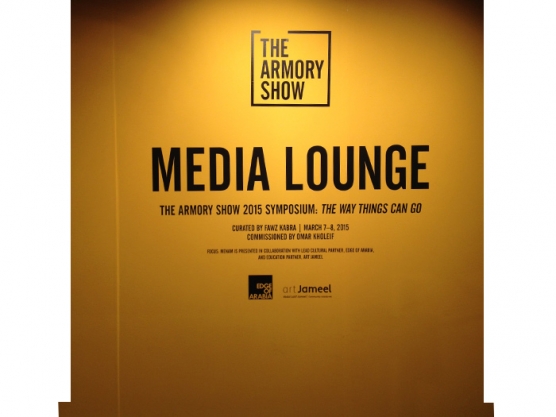
ENTRANCE TO THE MEDIA LOUNGGE WHICH HOSTED The Armory Show 2015 Symposium, The Way Things Can Go
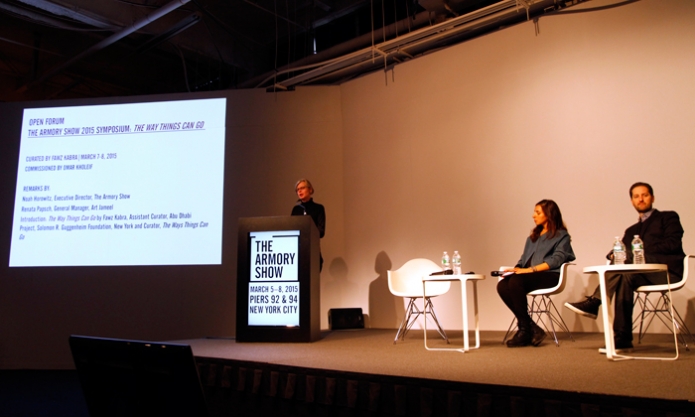
RENATA PAPSCH, GENERAL MANAGER OF ART JAMEEL, OPENS The Armory Show 2015 Symposium
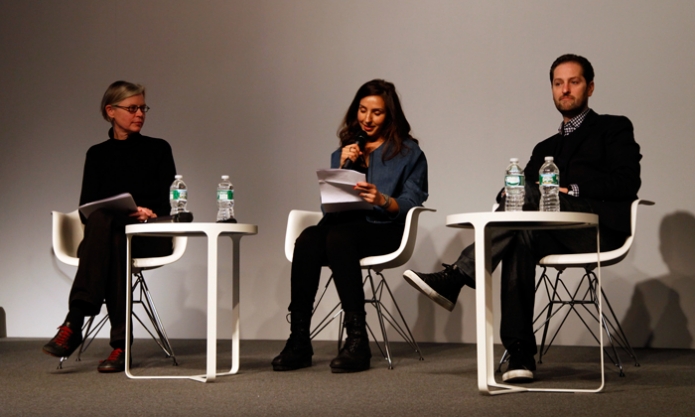
FAWZ KABRA INTRODUCES THE CURATORIAL THEME OF The Armory Show 2015 Symposium, The Way Things Can Go
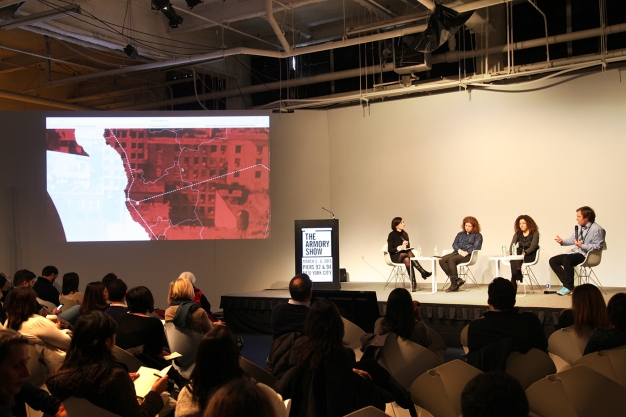
MAKING DISCOURSE PANEL with Anne Barlow, Aleya Hamza, Lamia Joreige and Stephen Stapleton
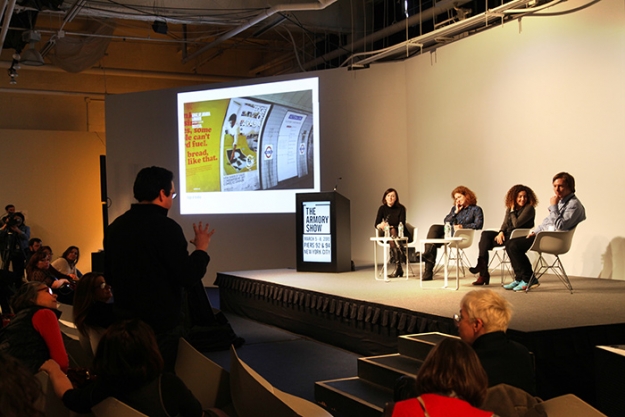
A QUESTION FOR EDGE OF ARABIA DURING ‘MAKING DISCOURSE’ PANEL MODERATED BY Anne Barlow
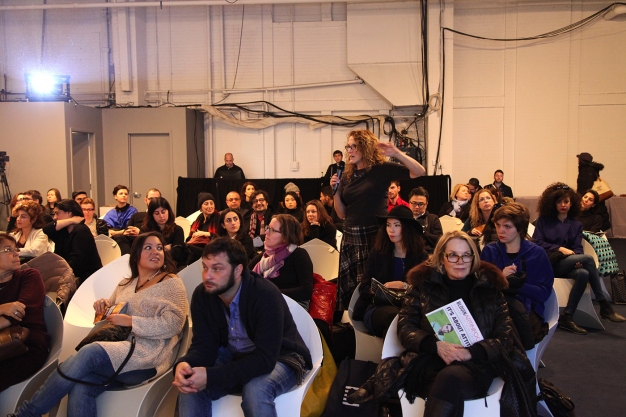
QUESTIONS FROM THE AUDIENCE DURING The Armory Show 2015 Symposium, The Way Things Can Go
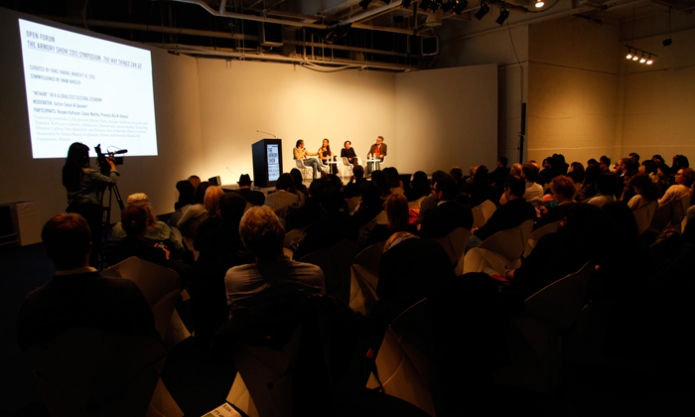
FULL HOUSE FOR OPEN FORUM: The Armory Show 2015 Symposium, The Way Things Can Go
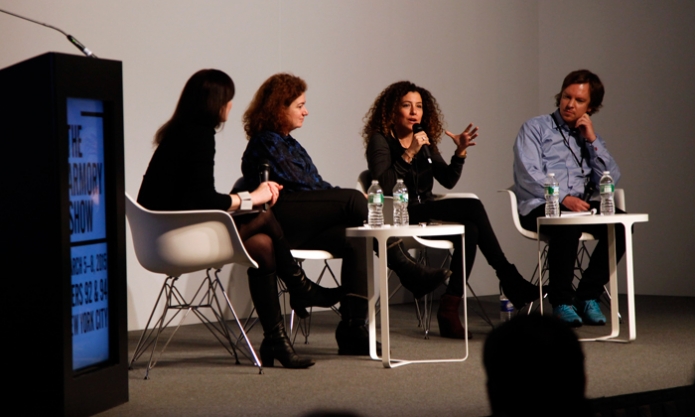
Aleya Hamza from Gypsum Gallery in Cairo during ‘MAKING DISCOURSE’ panel discussion
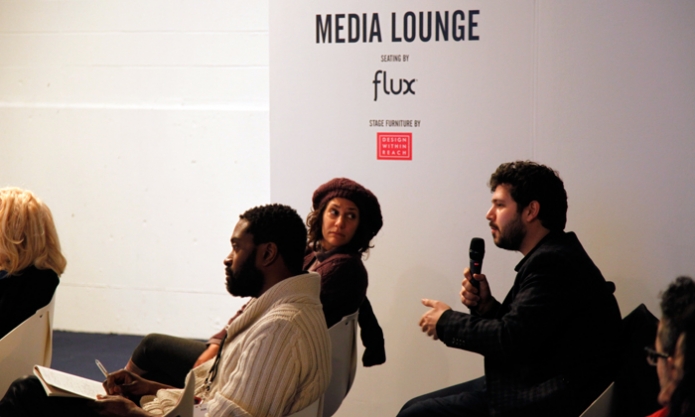
OMAR KHOLEIF, Curator of Armory Focus: MENAM, ASKING A QUESTION DURING THE SYMPOSIUM
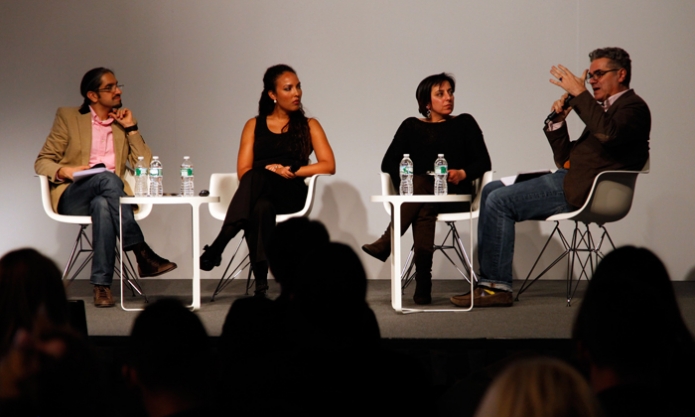
Roupen Kalfayan, from Kalfayan Galleries, Greece, discusses ‘MENAM IN A GLOBALIZED CULTURAL ECONOMY’
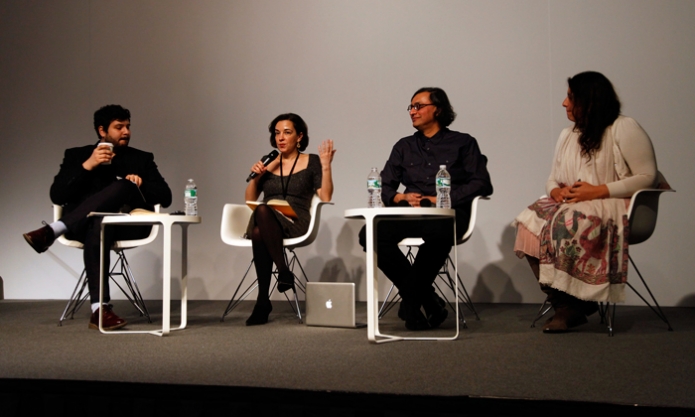
Omar Kholeif, Curator of Armory Focus: MENAM moderating ‘REMAPPING HISTORIES, EXPANDING TERRITORIES’
Curated by Fawz Kabra
The Armory Show 2015 Symposium, The Way Things Can Go, draws our attention to apparatuses that shape the discourse, economy, and culture surrounding contemporary art in the Middle East, North Africa, and the Mediterranean (MENAM). Imagined as a multimodal map, The Way Things Can Go works its way across a broad geographic region, centering on diverse institutions, projects, producers, artistic practices, and narratives that highlight the network that makes up this region’s current cultural and economic infrastructure.
With increasing popular attention given to the art and culture from the Middle East, North Africa, and the Mediterranean and their accompanying social, historic, economic, and political discourse, it feels more vital than ever to debate such geographic groupings and cultural constitutions. By bringing together key protagonists and representatives from major organizations to discuss the image of this region, The Way Things Can Go assembles the relationships, geographies, and histories of art alongside narratives of modernity and cultural production that have led to the contemporary art practices in this region.
The two-day Symposium is organized in thematic segments that analyze the state of regionalism, historical narratives, multiple modernities, the roles of established and alternative institutions, representation, newly evolving art scenes, and the role of the globalized cultural economy. Discussions will specifically highlight critical movements in the history of the region, artist-run initiatives and local gallery infrastructure, as well as the artists and artworks that complicate ideas of nationalism. These discussions will be coupled with ones on the nature of belonging, emerging markets, and new forms of funding and patronage. With these themes in mind, the Symposium aims to critically consider the apparatuses that have helped to bring about these changes in structure and development.
The cultural production of these regions is highlighted by the multiple voices joining the program; their actions and contributions have played a pivotal role in generating discourse that continues to influence modern and contemporary art production in the MENAM region. In bringing together these individuals in the context of The Armory Show’s Focus initiative, The Way Things Can Go hopes to initiate conversations that provide a new degree of insight into the forces – economically, socially, and politically – that have shaped, and continue to shape, the way art from this region is created, expressed, and shared.
Fawz Kabra, Assistant Curator, Abu Dhabi Project, Solomon R. Guggenheim Foundation, New York.
WELCOME REMARKS
Noah Horowitz, Executive Director, The Armory Show
Renata Papsch, General Manager, Art Jameel
Introduction to The Way Things Can Go by: Fawz Kabra, Assistant Curator, Abu Dhabi Project, Solomon R. Guggenheim Foundation, New York and Curator, The Ways Things Can Go
REMAPPING HISTORIES, EXPANDING TERRITORIES
MODERATOR: Omar Kholeif (Curator, Whitechapel Gallery, London and Curator, Armory Focus: MENAM)
PARTICIPANTS: Shiva Balaghi (Visiting Scholar at Brown University, Rhode Island); Iftikhar Dadi (Associate Professor, Department of History of Art & Department of Art, Cornell University, New York); Reem Fadda (Associate Curator, Middle Eastern Art, Abu Dhabi Project, Guggenheim Museum, New York)
The Middle East, North Africa, and the Mediterranean span two continents and contain an abundance of political, social, and geographical histories that have, in a multitude of ways, influenced the many art historical narratives of the region. Revisiting events and movements from the modern to the contemporary moment, participants discuss the histories that have shaped contemporary cultural production in the region as they expand on the vocabulary used to discuss its fluid borders and their role in restoring its art historical canon.
MAKING DISCOURSE
MODERATOR: Anne Barlow (Director, Art in General, New York)
PARTICIPANTS: Aleya Hamza (Founder and Director, Gypsum); Lamia Joreige (Artist and Co-Founder, Beirut Art Center); Stephen Stapleton (Co-Founder and Director, Edge of Arabia)
This panel brings together curators and artists who have founded innovative art institutions in the region, sometimes during unstable times. Here, they discuss how their work has contributed to the immediate cities their institutions inhabit and the writing of art narratives in the region and beyond. How do they envision their role in the contemporary art discourse of the region? How does the social and political landscape affect and shape this role? And, what do they foresee for these spaces in the future?
“MENAM" IN A GLOBALIZED CULTURAL ECONOMY
MODERATOR: Sultan Sooud Al Qassemi (Patron and Founder, Barjeel Art Foundation, Sharjah)
PARTICIPANTS: Tariq Al Jaidah, Roupen Kalfayan (Founder and Director, Kalfayan Galleries, Athens and Thessaloniki); Samar Martha (Founding Director, Gallery One, Ramallah); Princess Alia Al-Senussi (Patron, London)
Participants based in Athens, Sharjah, London, and Ramallah discuss how support and patronage may reveal a region’s cultural limit while considering its rapid growth and fluctuating status in today’s globalized cultural economy. How do politics and conflict affect the art market? How do we define the relationship between cultural production, new spaces for art, and the market? And where does the impact happen? How does the market change or expand funding and patronage? And does the globalized cultural economy effectively canonize and produce new art histories?
FILM SCREENING: INFERNO, 2013 BY YAEL BARTANA
Wrapping up the first day of the Symposium, the screening of Yael Bartana’s 2013 film Inferno allows us to contemplate questions of cultural identities, imagined and real, while exploring the production of a creation myth and the unfolding of the collective consciousness, its ubiquity, and the interchangeable global context where newfound temples become the harbingers of ruins. The screening is followed by an audience discussion with the artist.
INTRODUCTION AND RECAP OF DAY I: THE WAY THINGS CAN GO
Remarks by Fawz Kabra
ON REPRESENTATION
MODERATOR: Brian Kuan Wood (Editor, e-flux Journal, New York)
PARTICIPANTS: Tarek El Ariss (Associate Professor, Department of Middle Eastern Studies, University of Texas at Austin); Regine Basha (Independent Curator, New York); Nada Shabout (Professor, Department of Art Education and Art History, Director, Contemporary Arab and Muslim Cultural Studies Institute, University of North Texas)
Taking into account the heterogeneity of the region – or regions – of the Middle East, North Africa, and the Mediterranean, participants will speak about the defining concepts and objectives of criticism and theory today as they discuss the politics of representation and the multiplicity of experiences, communities, and modernities that frame the way in which these regions are viewed and historicized. What roles do theory and art historical research, publishing, and curating play in the making of a discourse? What are some of today’s urgent issues gripping the critical discourse in Middle East, North Africa, and the Mediterranean?
ARTIST AS INSTITUTION
MODERATOR: Fawz Kabra (Assistant Curator, Abu Dhabi Project, Solomon R. Guggenheim Foundation, New York, The Ways Things Can Go)
PARTICIPANTS: Amal Khalaf and Abdullah Al-Mutairi (GCC collective, Arabian Gulf); Marwa Arsanios (Co-Founding Director, 98Weeks, Beirut); Shuruq Harb (Director, Makan, Co-Founder, Art Territories, Amman); Khalil Rabah (Co-Founder, Al-Ma'mal Foundation for Contemporary Art, Jerusalem and Riwaq Biennale, Ramallah)
Despite the emergence of new museums and the revamping of past establishments, artists throughout the region are creating or performing their own institutions. From biennials to collectives, artist run projects and spaces, and publications, these artists are redefining how institutions are conceived and how they may function. Their critical grasp on various regional histories and rising national consciousness has produced new platforms for artistic and cultural awareness and production.
REGIONAL ATTACHÉS
MODERATOR: Nora Razian (Curator of Public Programs, Tate, London)
PARTICIPANTS: Sara Raza (Curator, UBS MAP, Guggenheim Museum, New York); Basak Senova (Independent Curator, Istanbul); Chen Tamir (Curator, CCA, Tel Aviv and Program Associate, Artis, New York)
Curators are often invited to contribute to national cultural projects and the building of region-specific arts collections and discourse, from biennials to museums. Their work throughout the region, or on behalf of the region, influences how contemporary art histories are being constructed and developed. Here, they discuss the obstacles, achievements, and pursuits in defining contemporary artistic practices relative to the region and how this may enable them to create new strategies for identifying and viewing the region.
THE ARMORY SHOW COMMISSIONED ARTIST: LAWRENCE ABU HAMDAN
Lawrence Abu Hamdan in conversation with Omar Kholeif
In his multimedia projects and installations, Lawrence Abu Hamdan, The Armory Show 2015 Commissioned Artist, explores the politics of listening and how it is utilized by both private and state apparatuses. In this discussion, Abu Hamdan speaks with Kholeif about various projects pertaining to the politics of voice and his Armory commission, A Convention of Tiny Movements, 2015. It will end with a screening of Double Take: Leader of The Syrian Revolution Commanding a Charge, 2014, a video work that brings to question how post-colonial history is constructed in an era of migration.
Visit our Facebook Page
Follow us on Twitter
Follow us on Instagram
Visit our Youtube Channel
Visit our Tumblr profile
Visit our Instagram profile
×